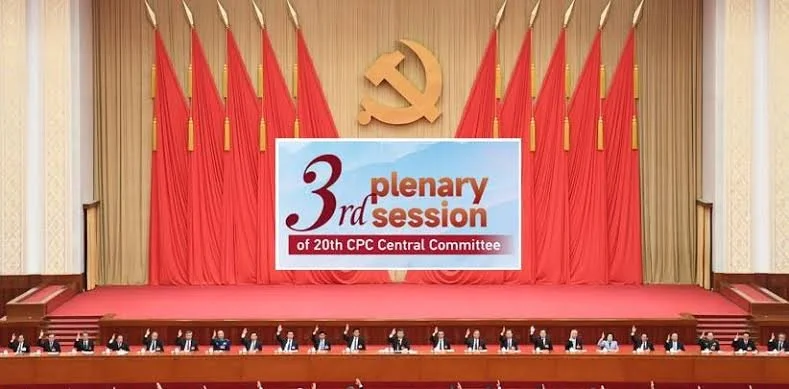China’s economic reforms won’t work until there are political reforms
Op-ed published in Globe and Mail on 25 July 2024
“We need a futile gesture at this stage.” These words, delivered by an RAF-officer character, come from the satire Beyond the Fringe, which was launched at the Edinburgh Festival in 1960, reaching Broadway in 1962 via London’s West End and puncturing the pomposity of the British elite along the way. In the scene, the officer warns a subordinate that the war is going badly, and that a futile gesture – his death – is needed to improve morale.
The members of the Central Committee of the Chinese Communist Party, who met last week at China’s Third Plenum, surely have no knowledge of Beyond the Fringe. But their 20,000-word Resolution – the framework for how China will be governed for the next five years – instantly brought to my mind that cutting phrase.
The Resolution acknowledges a wide array of problems faced by China, especially in its economy; it lists measures to deal with them, often in considerable detail, and it proclaims numerous goals for national development, many of them worthy. But after reading it, I was left with a sense of futility. That’s not surprising, since it has effectively been drafted by political prisoners: intellectually, Central Committee members are prisoners of the Party they pretend to lead.
The political will needed to design and implement remedies that match the gravity of the problems does not exist in China, because this Third Plenum of the 20th Central Committee is the stillborn child of a contradiction. The reform era, launched by Deng Xiaoping in 1978, gave China economic liberalization without political reform; in 2008, the CCP called a halt to that project because it threatened its monopoly on political power. China’s economy can only be restored to health by resuming its full liberalization – and that requires systemic political change.
The great majority of China’s political elite understand that. But President Xi Jinping is determined to defend the present system, and he currently has sufficient grip on the levers of hard power – the country’s military and security apparatus – to block change. Consequently, achievement of the worthy goals enunciated by the Resolution – shifting from rapid growth to high-quality growth, reducing pollution and carbon emissions, and strengthening social security – will be stymied by a failure to tackle the deepest problems generated by the contradiction between economic change and political stasis.
The most spectacular of these is the collapse of the property market. It has undermined household savings, more than 75 per cent of which has been invested in property; it has undermined economic growth, 30 per cent of which was driven by property development, until the collapse; and it has undermined local government revenues, 40 per cent of which previously came from the sale of land to developers.
In China, local governments matter hugely: they raise more than half of total government revenues and account for more than 85 per cent of total government expenditure. But in its latest report on the Chinese economy, the International Monetary Fund warned that “fundamental demand for new housing is expected to decline by almost 50 per cent over the next 10 years… in some regions, the adjustment could be much sharper.” To put it bluntly: there is no prospect of reviving land sales as a source of local government revenue in the foreseeable future.
The collapse in this source of revenue has come on top of another problem: local government’s heavy reliance on debt financing. To quote the IMF again: “In all but the richest provinces, local government augmented debt is well above 60 per cent of GDP … local government’s own business models are in most cases unsustainable, with negative cash flows from operations.”
Central government cannot bail out local government because the problem is too big. But the regime cannot just inflate the problem away, because that would undermine the currency.
Local governments are effectively using Ponzi schemes to keep themselves afloat. When those schemes run out of road, as sooner or later they must, there will be dire consequences for services, employment, savings and the financial system. Outrage and unrest will follow, and threaten social stability. To save what they can of their own wealth and power, China’s elite and 600-million-strong property-owning class will demand an end to the political system that has caused this national disaster, and its replacement by one that gives them freedom of expression, rule of law and a right to vote.
In the meantime, last week’s meeting of the Central Committee will go down in history as one more futile gesture in denying reality and staving off the fundamental change that’s needed.
